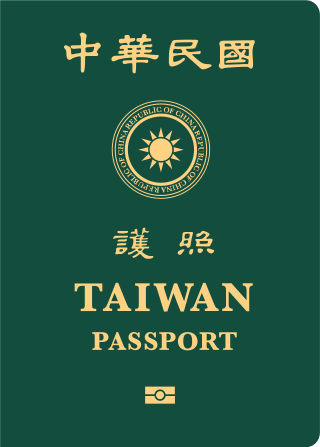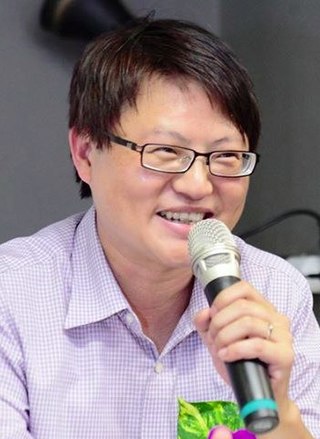
The Taiwan Democratic Self-Government League (TDSL), also known by its Chinese abbreviation Taimeng, is one of the eight minor political parties in the People's Republic of China under the direction of the Chinese Communist Party.

The Republic of China (Taiwan) passport is the passport issued to nationals of the Republic of China. The ROC passport is also generally referred to as a Taiwanese passport. In September 2020, approximately 60.87 percent of Taiwanese citizens possessed a valid passport. All passports published in Taiwan since 2008 have been biometric.

Kiku Chen Chu is a Taiwanese politician serving as president of the Control Yuan and chairwomen of the National Human Rights Commission since 2020. Before assuming her current post, Chen had served as Secretary-General to the President from 2018 to 2020 and Mayor of Kaohsiung from 2006 to 2018, making her the longest-serving mayor of the city since the Japanese occupation of Taiwan.

Chen Po-liang is a Taiwanese professional footballer who plays as a midfielder for Chinese Super League club Qingdao West Coast. He is also captain of the Chinese Taipei national football team and their top scorer and made most appearances.

The China Democratic Socialist Party was a Chinese political party founded in Shanghai on 14 August 1946. It was formed through the merger of the former Chinese National Socialist Party and the Democratic Constitutionalist Party. The inaugural leader of the party was Carsun Chang. Along with the Kuomintang, the Young China Party and China Democratic League, it was one of the longest active political parties in both Nationalist China and in post-civil war rump Republic of China in Taiwan.
"Mutual non-recognition of sovereignty and mutual non-denial of authority to govern" is former President of the Republic of China Ma Ying-jeou's description of the relations between the Taiwan Area and Mainland China, as presented in his second inauguration speech after being re-elected in 2012. Sometimes the term special non-state-to-state relations is used in the press for this concept, following his own statements. Ma defines the relations as a "special relationship for which the model of [state] recognition under conventional international law is not applicable". This marks a departure from the views of his predecessors, former presidents Lee Teng-hui's special state-to-state relations and Chen Shui-bian's One Country on Each Side: Both defined the Republic of China (ROC) and the People's Republic of China (PRC) as states and the relationship between the two as one between two states. In Ma's view, the ROC government considers the one China as the ROC, regardless of the view of the PRC government. While neither governing authority can recognize that in the other area as a legitimate state, neither would deny the other side being the de facto governing authority of its area.

The White Terror was the political repression of Taiwanese civilians and political dissenters under the government ruled by the Kuomintang (KMT). The period of White Terror is generally considered to have begun when martial law was declared in Taiwan on 19 May 1949, which was enabled by the 1948 Temporary Provisions against the Communist Rebellion, and ended on 21 September 1992 with the repeal of Article 100 of the Criminal Code, allowing for the prosecution of "anti-state" activities. The Temporary Provisions were repealed a year earlier on 22 April 1991. Martial law had been lifted on 15 July 1987.

Larisa Angela Bakurova is a Ukrainian-born Taiwanese actress and model.

Taiwan–Ukraine relations refer to the international relations between Taiwan and Ukraine. Bilateral relations after Ukraine's independence began in 1992.

Kolas Yotaka is an Amis Taiwanese politician and journalist. From 2020 to 2022 and again in 2023, she served as spokesperson for the Office of the President under Tsai Ing-wen. Kolas previously served as spokesperson for the Executive Yuan in 2018, the first Taiwanese aboriginal to hold the position.

The Chinese Unification Promotion Party, also known as the Unionist Party, is a minor far-right political party in Taiwan that promotes Chinese unification.

The Taiwan Statebuilding Party is a political party in the Republic of China (Taiwan). The party was established in 2016 as Taiwan Radical Wings. The party is considered a rather close ally of the DPP, while fighting to replace opposition parties whom TSP unilaterally claims as “not loyal to Taiwan”, such as Kuomintang and TPP. In Taiwan’s 2024 Legislative Election, TSP failed to gain any seat in the Legislative Yuan and lost its status as a national political party.

Revolution of Our Times is a 2021 Hong Kong documentary film directed by Kiwi Chow. With interviews and footage of the frontline protest scenes, the film covers the stories of the 2019–2020 Hong Kong protests. The documentary takes its name from a locally well-known political slogan "liberate Hong Kong, revolution of our times" which has been ruled as illegal by the Hong Kong High Court. The film had its debut in the 2021 Cannes Film Festival in France and is currently banned in China and Hong Kong.

On 29 December 2021, Stand News, one of the few remaining pro-democracy media outlets in Hong Kong following the passage of the Hong Kong national security law in 2020, was raided by the National Security Department of the Hong Kong Police Force. Media executives and journalists were arrested on the charge of "conspiring to publish seditious publications" on a large scale. As a result of the raid, Stand News ceased operations, the organisation's website and social media became inactive, and all its employees were dismissed. The Office of the United Nations High Commissioner for Human Rights, along with leaders in Canada, Germany, the United Kingdom and United States, condemned the raid.
Following the Russian invasion of Ukraine, China's position has been ambivalent. On one hand, it has blamed enlargement of NATO, which Russia has stated as a reason for starting the war. On the other hand, it has stressed respect for Ukraine's territorial integrity. China has not condemned the Russian invasion of Ukraine and has abstained during United Nations votes on the war in Ukraine.
Tseng Sheng-guang, also known as Jonathan Tseng, was a Taiwanese army veteran who volunteered to join the International Legion of Territorial Defence of Ukraine and was the first soldier from East Asia to be killed in action during the Russo-Ukrainian War.
The 2023 Democratic Progressive Party chairmanship election was held on 15 January 2023 to elect the new chairperson of the party. Vice President William Lai was unopposed and elected to succeed President Tsai Ing-wen, who resigned after the party's poor showing in the 2022 local elections.

Lin Chih-chien's paper plagiarism case is an academic dishonesty incident in Taiwan's history. In July 2022, Lin Zhijian, a recent Department of Science graduate and Technology Management of Chung Hua University and the National Development Institute of National Taiwan University with two master's degrees and who announced participation in the mayoral election of Taoyuan City was accused by Wang Hongwei and others of copying two thesis. Zhonghua University and Taiwan University, respectively, both concluded that Lin Zhijian's thesis involved plagiarism and violated academic integrity, and their master's degree was revoked. Lin Zhijian was involved in copyright issues for plagiarism, which were also filed in civil infringement and criminal proceedings.

Wang Mei-hui is a Taiwanese politician and member of the Democratic Progressive Party who has served in the Legislative Yuan since 2020. Before being elected to the Legislative Yuan, Wang was a member of the Chiayi City Council from 2005 to 2020.
Since the Russian invasion of Ukraine in February 2022, it has created much debate within the population of Hong Kong. There were many associations between the war and the 2019 Hong Kong protests three years before, mainly from the pro-democracy camp. On the other hand, many from the pro-Beijing camp downplayed the relevance of the war.















